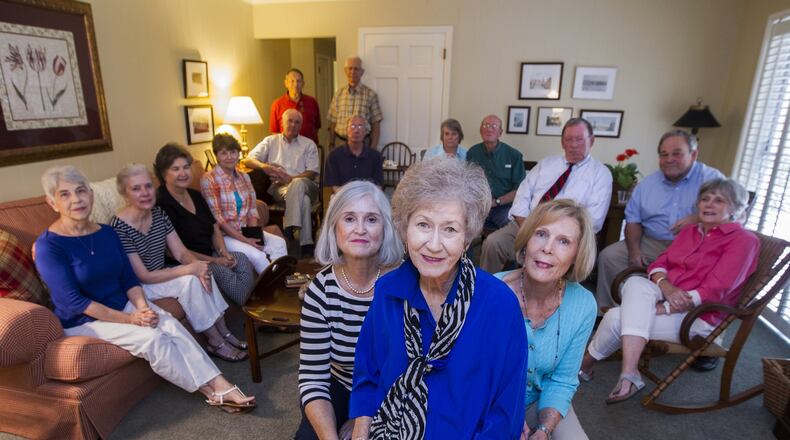The 18 church friends who gathered at Karen McGehee’s ranch house here this summer came from all walks of American life — former school teachers, lawyers, government employees, a lobbyist and a pastor. “Old-time, white middle class people,” as one described, the kind of people who trusted police to do the right thing.
Not any more.
This summer, they read the AJC/Channel 2 Action News report about how two Glynn County police officers shot and killed Caroline Small, McGehee's daughter and a woman many had known since she was a girl in church with their own children. Some watched the dashcam video that showed the police surrounding Small's car and firing eight times through the windshield as the unarmed 35-year-old was pinned against a utility poll, and heard them compare their marksmanship after shooting her in the head and face.
Last month, they formed “Justice for Caroline Small.” The initial 18 members has swelled to 50 and they held their second meeting last week.
Their anger over the shooting was palpable when they met this month with AJC and Channel 2 reporters at McGehee’s home. Most knew Caroline as a little girl and watched her grow up. Many are now grandparents and empathize with her mother and their friend, and grieve for the two children Caroline left behind.
“To see those bullet holes appear in that windshield and know that Caroline is in that car…” said Bob Apgar, choking back tears.
Wayne McDaniel, a family friend who counts two former county sheriffs among his family, summed up his outrage this way:
“Any officer that wants to play Clint Eastwood and shoot people and then has that attitude really don’t belong in law enforcement anywhere,” He said. “They are supposed to be protecting and serving. They didn’t protect Caroline and they didn’t serve her.”
Revelations about the 2010 case, including how the officers escaped consequences and the local district attorney manipulated the grand jury, have shaken their confidence in the legal system. They say they are just coming to grips with truths that had been hidden from them for years. They now believe a gross injustice occurred in Brunswick and they are making those beliefs public.
They've created a Facebook page with videos, news reports and information about the shooting, and have started an online petition to gain support for their cause. They hope to press Georgia authorities and federal officials to reexamine the case, investigate the Glynn County Police Department and review whether the two officers who killed Small should keep their state police certification.
Galvanized to action
In July, the AJC and Channel 2 reported that Glynn County police interfered with the GBI's investigation of Small's death and created a misleading video animation of the shooting that was shown to the grand jury. The retired GBI supervisor who oversaw the case told the AJC it was the worst police shooting he'd ever investigated.
The report also highlighted the unprecedented latitude that the local district attorney granted the officers and their attorneys, allowing them to question grand jury witnesses and gain prior access to the state’s evidence.
The grand jury voted to clear the officers in 2011 and a federal judge dismissed a civil lawsuit last year. Yet even five years later, grand jurors told the AJC that a local trial jury deserved to hear the case.
On the surface, the group organizing around Small’s shooting looks nothing like the waves of demonstrators who have taken to the streets following the fatal police shooting of an unarmed black man in Ferguson, Mo., to protest police violence against African Americans. Many are white-haired retirees who spent their careers working in government and civic institutions. Several have personal or professional ties to law enforcement.
But like those demonstrators, the troubling facts surrounding the shooting of an unarmed woman has frayed their willingness to give police the benefit of the doubt, and transformed them into activists.
“It changes in some ways the way that you view the police and just thinking they are there to protect you,” said Kay Allen, a family therapist. “And it’s kind of like ‘Well, maybe not. Maybe there’s another side to things that we don’t always know about.’”
Bonds forged in Fla.
Religion pulled Caroline Small’s family to Tallahassee in 1976 when her father, Mike McGehee, became senior minister of Faith Presbyterian Church. The church was central in her life growing up in this Capitol city just 20 miles south of the Georgia line. Even after her parents divorced in 1982 and her father left Florida, Caroline and her mother and younger brother, Michael, continued to attend the church, forging bonds through the church and its youth program. Those relationships are now the foundation of the “Justice for Caroline Small” campaign.
A church elder and former youth program leader, Wayne McDaniel remembers Small as a teenager full of life and laughter who grew up with his kids. He remembers driving her and others by bus to youth conferences in Montreat, N.C., or spending time at all night lock-ins during high school.
When he learned that Small had been shot, he and his wife, Carol, drove to Savannah to offer Karen McGehee and her family support as they held vigil over Caroline in the hospital. Despite the severity of the bullet wounds to her head, Small clung to life support for a week as the McDaniels and other friends and family prayed for recovery.
He said the sting of her loss still effects the families who were close to her.
“When you are going through old pictures of the church groups and talking to your kids and all that, she’s there,” said McDaniel, a retired deputy secretary with Florida’s department of health. “She’s a person that we watched and loved.”
Carol was in the hospital room and prayed with Karen and her family after Caroline slipped away into death. She said her friends were more focused on helping Caroline’s family cope with their grief than questioning the official police version of how and why she was shot.
“Karen is one of the strongest people I’ve ever known,” said McDaniel, a retired first grade teacher. “She’s grieved unmercifully and missed her daughter tremendously. It’s sad. It’s very sad. It’s very troubling. I grieve for her.”
For her part, McGehee said she was either oblivious to the facts surrounding the case or in such shock that she wasn’t able to critically examine the police officers’ actions. Many of the details in the AJC/Channel 2 investigation were revelations to her. She said while painful she’s thankful she now knows the full story.
“It was like going through the grief process again but it’s worse this time because I knew what happened,” she said.
McGehee, a retired first grade teacher, said she was particularly troubled by the way the case was handled by Glynn County Police and by the local prosecutor, Jackie Johnson.
“I was just stunned,” she said. “You want to believe the best in the legal system. You want to believe the best with your officers. We taught first graders to respect the law, that these were your friends and everything. But the way the whole (thing) took place it just astounded me these things could actually happened in the ways that they did happen.”
A call to action
Most of McGehee’s friends had heard about the June 18, 2010, shooting shortly after it occurred.
If they knew anything of the details, it was that police had been called to a shopping mall in Brunswick after someone suspected Small of doing drugs in her parked car. They knew she had led police on a low-speed chase and that they had shot her when they claimed she tried to run them over with her car. Even though her friends knew about her struggles with addiction, several also believed that the official version of what happened didn't add up.
The idea that Small would try to run over police didn’t square with the person they knew and watched grow up. They had never seen Caroline act violently.
For some, the dashcam video was particularly haunting.
“I watched it and had the same response as everybody else — just complete shock and really kind of horror this all happened,” said Allen.
Recent publicity drew national attention to the case, but has not attracted protests in Georgia. A Facebook post detailing the AJC's story in July caught the eye of Drin Apgar in Tallahassee.
She showed it to her husband, Bob, an attorney. They asked Karen if there was something they could do to help.
“Word just started spreading about it and that’s how it basically started,” said Bob Apgar, who along with his wife brought the original nine or 10 families together for the Aug. 18 meeting.
‘They were angels’
The first meeting was held over homemade cookies and coffee at McGehee’s tidy one-story home, where family photos and Caroline’s artwork line the walls. The group has delegated tasks with the efficiency of a church fundraising drive.
They plan to contact Gov. Nathan Deal and the U.S. Attorneys office in South Georgia as well as build support with local people in Brunswick who may also think the case deserves a fresh look and a new grand jury to consider it.
The group says they respect police and recognize they have a difficult job. But they share collective disbelief at what happened in Brunswick five years ago and a frustration that it took so long for the details to come out.
“It’s shocking,” said Frank Walper, a retired educator. “It sounds like something out of the past that they used to make movies about. It just doesn’t seem the way things should be handled today in the United States of America. It’s just not right.”
At a recent meeting, it’s clear there’s familiarity and trust forged by decades of church and social gatherings and neighborly acts of kindness. They talk about how Karen has helped others get through difficult times. Now, it’s their turn.
“This was such a horrible thing that shouldn’t have happened and they wanted to do something about it,” said Karen McGehee. “It’s hard to describe the feeling in that room, but there was such love and care and concern for Caroline and for me and my family from these longtime friends. I felt like they were angels.”
Learn more
Log on to AJC.com to read the AJC’s report on the shooting death of Caroline Small and watch the dashcam video that helped spark the “Justice for Caroline Small” campaign in Tallahassee. Read more about the AJC’s coverage of police shootings in Georgia at investigations.ajc.com/overtheline/
About the Author
Keep Reading
The Latest
Featured



